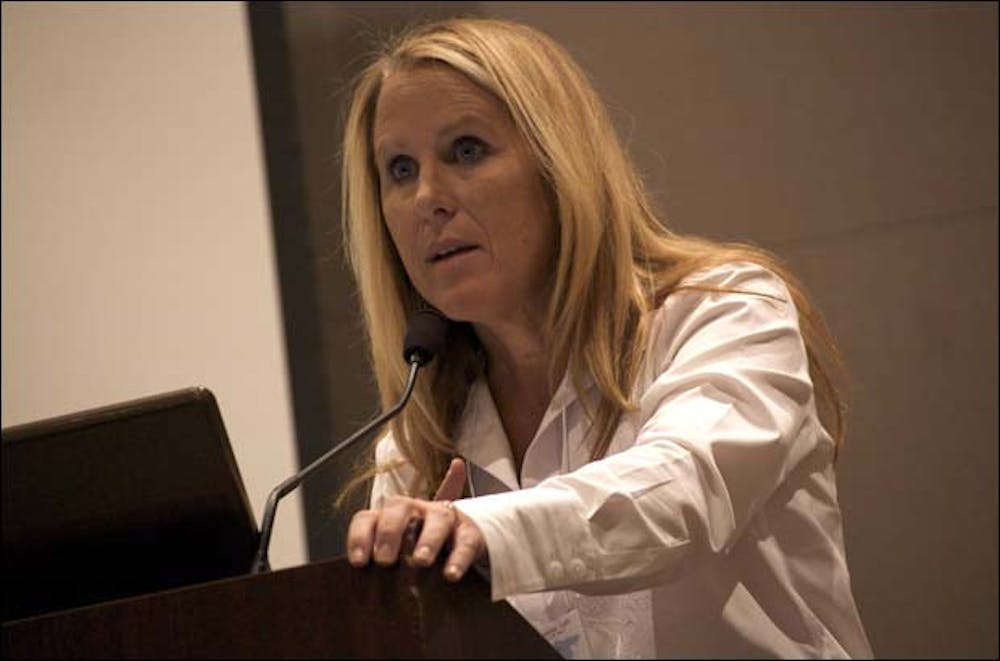A daylong program on the West campus Wednesday called for increased awareness of social trauma, specifically highlighting local human rights issues.
The event, “Trauma and Compassion,” was presented by the master’s program in social justice and human rights, the Amnesty International ASU West chapter and the human rights group Light of Hope Institute.
The series began with traditional Indian and Bollywood dance demonstrations.
Rev. Ken Heintzelman of Phoenix’s Shadow Rock United Church of Christ explained social injustice by recounting the story of Marcia Powell.
Powell was an inmate at a Goodyear prison last May when she was locked in an outdoor cage, collapsed and died.
“Here was a human being that was put into a cage in the heat of the Arizona sun,” Heintzelman said. “She was there for four hours. She was not checked on.”
The congregation at Shadow Rock decided to bury Powell, giving her a final chance to recover her dignity, he said.
“If the state is going to give her a box to die in, then people of conscience and people of faith can give her a box to rest in,” he said.
Heintzelman pointed to Powell’s treatment as an example of injustice directed toward women, contrasting her imprisonment with the freedom of the program’s earlier belly dancers.
“Here were women who were being expressive. There was joy, there was assertiveness, there was strength,” he said. “And yet all over the world, there are women who are victimized … for being true to themselves.”
Powell’s story wasn’t the only local controversy highlighted during the panel.
President of the Liberian Association of Arizona Robert Sherman also discussed the alleged rape of an 8-year-old Liberian girl by four young boys last July.
The oldest boy suspected in the case, 14, is currently in prison as an adult, Sherman said.
“We don’t like that very much at all,” he said. “It is our goal to bring him back to juvenile justice.”
Sherman also said his group seeks to reunite the young girl, currently in the custody of Child Protective Services, with her family.
“Our goal is complete unification of the girl and her parents. We do not want them to lose their Liberian heritage or their cultural identity,” he said.
Sherman called the incident traumatizing for Arizona’s Liberian community — a group that has already faced significant immigration and adaptation trauma.
“Arriving in Arizona, they are not in power to become productive,” he said. “Even to use a washer or dryer, or pick up the phone to call for health care services, all of it is new to them.”
Rachel Aherin, community outreach coordinator for the International Rescue Committee, said the current economic environment puts an even greater strain on refugees in America.
“When refugees escape, they need a solution that is durable,” Aherin said. “That’s really difficult when you have a 10 percent unemployment rate.”
Rep. Kyrsten Sinema, D-Phoenix, and chair of the House Appropriations Committee Rep. John Kavanagh, R-Fountain Hills, spoke on that unemployment rate and other financial struggles blocking the state from providing many social programs.
“The enormity of the problem cannot be overstated,” Sinema said.
She pointed to certain cuts the Legislature considered necessary, yet have had serious effects on the public.
“We eliminated half of the funding for Children Rehabilitative Services,” Sinema said, referring to a government service that provides surgeries for seriously ill and disabled children.
“Without these surgeries, these children will in fact die,” Sinema said.
Party lines were quickly drawn between Sinema and Kavanagh, who questioned the logic behind maintaining funding for music therapy and all-day kindergarten programs, yet not child abuse prevention programs.
“Music therapy is actually quite important for children who are disabled,” Sinema replied. “Now does [music therapy education] equal the same thing as… child abuse? No. But do we need to have a real, honest conversation about where we put our funding? Absolutely.”
The representatives did agree on the serious need to have that conversation for the people, if not for the governmental process.
“[As a state,] where are we at? Super bad,” Kavanagh said. “It’s going to be very difficult to do any more non-permanent solutions. You either cut spending or you increase revenue.”
Becky Coplan, a social justice and human rights master’s student and coordinator for the Amnesty International ASU West chapter, said discussions fueled by “Trauma and Compassion” are meant to cross those political lines.
“It’s really about educating people. The issues — trauma and compassion — are not limited to the Mexican border issues,” Coplan said. “It’s about bettering lives for everyone.”
Reach the reporter at jessica.testa@asu.edu.




